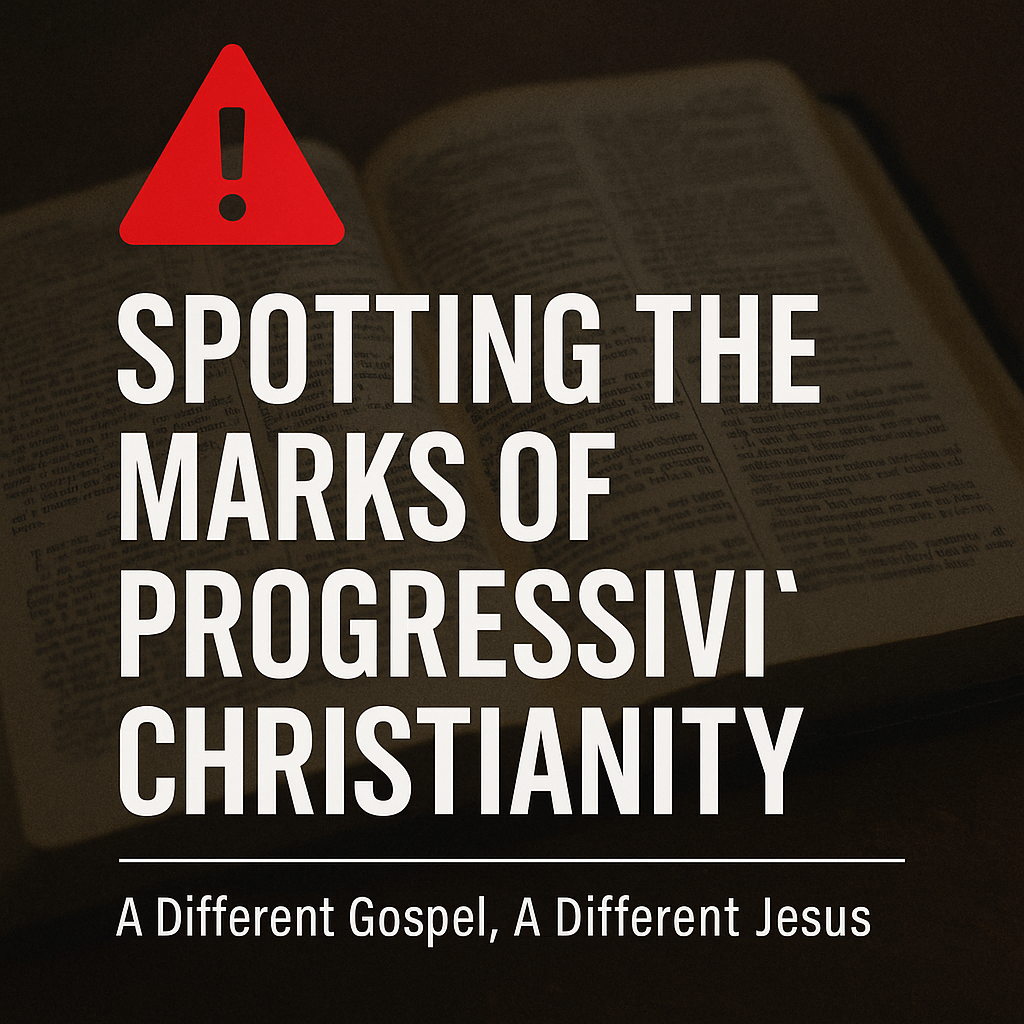⏱️ Estimated Reading Time: 5 min read
Spotting the Marks of “Progressive” Christianity
The question this article will seek to answer is one many are asking today: What is progressive Christianity, and how is it different from biblical Christianity?
The answer is straightforward—at its core, progressive Christianity isn’t just a different style of Christianity. It is a different religion.
Progressive Christianity presents itself as modern, thoughtful, and compassionate. It emphasizes justice, inclusivity, personal experience, and rethinking tradition. It often uses familiar language—words like Jesus, grace, kingdom, and love—but it redefines those terms in ways that depart from historic, biblical Christianity.
One of the most significant differences lies in how progressive Christianity views Scripture itself. Rather than treating the Bible as the inspired, inerrant, and sufficient Word of God, it is often considered simply a human record of people wrestling with spiritual ideas. Personal conscience and cultural values are elevated over biblical commands, leaving each person to decide what is true for themselves. As a result, a common mantra emerges: “We take the Bible seriously, not literally.”
This shift in authority inevitably leads to a redefinition of Christian ethics, particularly in the area of sexuality. Progressive churches reject the historic Christian understanding of marriage and sexual morality. Love is redefined as unconditional acceptance, and compassion becomes synonymous with affirmation. LGBTQ+ identities and same-sex relationships are not only tolerated but celebrated as expressions of human authenticity, with inclusion elevated as the highest virtue.
Alongside this redefinition of morality is a reimagining of salvation itself. Many progressive Christians embrace universalism or a softer version of it, believing that all sincere people will ultimately be saved regardless of their relationship to Christ. Hell is often denied outright or described simply as separation from God without judgment for sin. This perspective erases the urgency of repentance and the exclusivity of Christ’s saving work.
Another hallmark of progressive Christianity is the prioritization of social justice over personal salvation. While caring for the poor, addressing injustice, and stewarding creation are important biblical callings, they are never substitutes for the gospel of grace. Yet in progressive circles, activism often overshadows the message of sin, repentance, and reconciliation with God. The focus shifts from the eternal to the temporal, trading the hope of salvation for the cause of societal transformation.
Perhaps most dangerously, progressive Christianity redefines Jesus Himself. Rather than the crucified and risen Savior who bore God’s wrath for sinners, Jesus becomes merely a moral example, a social reformer, or an inclusive spiritual guide. The cross is emptied of its meaning as a substitutionary sacrifice, leaving people inspired but unredeemed.
This reimagined version of Christianity stands in sharp contrast to the faith once for all delivered to the saints. Where progressive Christianity treats the Bible as flexible spiritual insight, biblical Christianity holds it as the authoritative Word of God (2 Timothy 3:16–17). Where progressive faith affirms identity as it is, Scripture calls us to repentance and a new identity in Christ (2 Corinthians 5:17). Where progressives see Jesus primarily as a liberator or teacher, Christians proclaim Him as the Lord and sin-bearing substitute (Romans 3:25). While progressive Christianity focuses on temporary justice, biblical faith keeps eternal salvation at the center (1 Peter 1:16). And where progressives regard truth as evolving and personal, believers stand on truth that is fixed and revealed (John 17:17; Jude 3).
The danger of progressive Christianity is that it retains the appearance of Christianity but denies its power. As Paul warned in 2 Timothy 3:5, some will have a form of godliness while rejecting what makes it life-giving. Familiar words—love, justice, and faith—are redefined in ways the Bible never intended. Love becomes unconditional affirmation. Justice becomes social revolution. Faith becomes personal authenticity.
This distortion does not merely confuse people; it leads them away from the real gospel. By removing sin, wrath, and substitution, progressive Christianity offers comfort without conversion, Jesus without the cross, and spirituality without the Spirit.
What Should Christians Do?
First, we must know the real gospel. Don’t settle for vague slogans or sentimental language—know what the Bible actually teaches about God, sin, salvation, and holiness.
Second, stand firm on the truth, even when it’s unpopular or offensive.
Third, speak with clarity and compassion. Many people drawn to progressive Christianity are sincere, wounded, or disillusioned by hypocrisy in the church. They need both truth and hope.
Finally, test every voice, no matter how winsome or popular it sounds. Christian vocabulary does not guarantee biblical fidelity.
“For certain people have crept in unnoticed… who pervert the grace of our God into sensuality and deny our only Master and Lord, Jesus Christ.” — Jude 4
The true gospel doesn’t affirm us in our rebellion—it rescues us from it. That is real hope. That is real love. That is the message we must contend for.
For Further Study
- The Word Matters by Dave Jenkins
- The Gospel According to Jesus by John MacArthur
Dave Jenkins is happily married to his wife, Sarah. He is a writer, editor, and speaker living in beautiful Southern Oregon. Dave is a lover of Christ, His people, the Church, and sound theology. He serves as the Executive Director of Servants of Grace Ministries, the Executive Editor of Theology for Life Magazine, the Host and Producer of Equipping You in Grace Podcast, and is a contributor to and producer of Contending for the Word. He is the author of The Word Explored: The Problem of Biblical Illiteracy and What To Do About It (House to House, 2021), The Word Matters: Defending Biblical Authority Against the Spirit of the Age (G3 Press, 2022), and Contentment: The Journey of a Lifetime (Theology for Life, 2024). You can find him on Facebook, Twitter, Instagram, Youtube, or read his newsletter. Dave loves to spend time with his wife, going to movies, eating at a nice restaurant, or going out for a round of golf with a good friend. He is also a voracious reader, in particular of Reformed theology, and the Puritans. You will often find him when he’s not busy with ministry reading a pile of the latest books from a wide variety of Christian publishers. Dave received his M.A.R. and M.Div through Liberty Baptist Theological Seminary.




